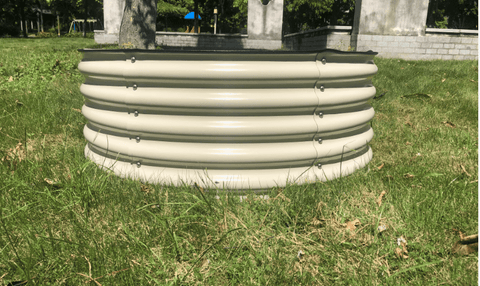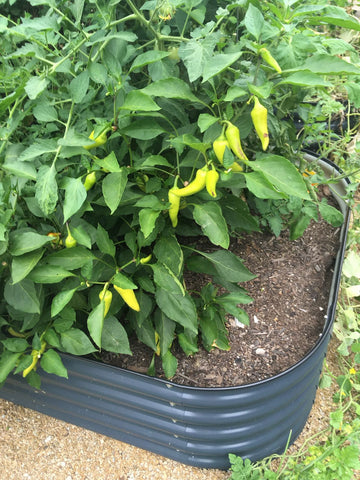Tips from Olle Garden Bed: Some Ways To Kill Ants On The Lawn
Most ants are considered beneficial. They loosen the soil and help ventilate. They also help keep ecosystems clean by moving dead insect carcasses and using their remains and plant debris as nests. Ants are also one of the main predators of other insects, which helps minimize pests in the garden. The following content also has some reference value for raised garden beds.
But ants can be annoying, and if they do, you might want to get rid of them. There are many ways to kill ants that nest in and under lawns. Methods range from pesticides to cheaper, safer natural therapies. Care should be taken to ensure that you do not damage the lawn or affect natural predators that play an important role in natural balance.

Can ants ruin your lawn?
The quick answer to this question is, yes, ants will destroy your lawn. But the ants, grass and other vegetation found in some areas are different. Some types of ants cause much more damage than others.
Imported red fire ants
For example, in the southern United States, the imported red fire ant (RIFA) Solenopsis Invicta is a serious pest, especially on golf courses. It creates ugly mounds of soil on the family lawn. It also has unpleasant tingling and may cause allergic reactions‘
Other ants
RIFA ants are not ubiquitous in the United States, but there are many other types. Some ant species inhabiting our lawn include small black ants, short legged road ants, corn field ants and larger yellow ants.
As entomologist Gregory A. Hoover pointed out in an article on the promotion website of Pennsylvania State, ants rarely cause serious damage to family lawns. In fact, because many people are predators and scavengers of harmful insects, they are beneficial.
He said they sometimes cause minor damage by loosening the soil and building small mounds in the nesting areas. They also feed on honeydew secreted by aphids, soft scales and mealybugs.
Donald Lewis of the Department of Entomology at Iowa State University agrees. "Most ants do not need to be controlled and are considered beneficial. But he did say that when they build mounds on the lawn or invade houses to find food, they may become annoying.
Lasius Neoniger of Michigan State University's Department of Integrated Pest Management says ants are beneficial because foraging workers often collect larvae and eggs of lawn pests. But in golf courses and gardens, ant mounds can be a problem because the grass moves very quickly (less than 1 inch).
Dr. Pat Vittum wrote an article for the lawn expansion plan of UMass University of Massachusetts, pointing out that ants may be pests in lawn grass areas, because they will build ugly mounds and tunnels and break grass roots. But he added, "Ants are usually negligible pests on family lawns.
At the same time, Dr. Vitum warned that if the ant population level rose, their activities would cause "unacceptable turf damage". Then you will want to get rid of ants.

10 safe ways to get rid of ants in lawn
So, the question is, how to remove ants from the lawn?
There are many ways to get rid of ants on the lawn. In the long run, some people are more successful than others. Some methods are safer than others.
As we said before, it is important to choose your method carefully and avoid killing beneficial insects, including pollinators and lawns. Entomologists often warn that many home remedies do not work at all.
But this does not mean that traditional pesticides will also work. For example, according to Dr. Vitum, field studies have shown that some pesticides do not kill ants, but induce them to leave.
Lasius Neoniger has a similar theory. He said that although some pesticides were very effective when the ant mound was destroyed, the ants tended to colonize quickly. In addition, mowing can remove pesticide residues and decompose them in the sun.
The University of Florida IFAS Extension warned that if you want to get rid of ants on the lawn, you must kill the queen of the colony. In some colonies, there were many queens. Therefore, even if the queen ant is killed, the surviving ants will often make a new mound until they die.
The method we suggest below applies to all types of ants. They cover how to kill ants and how to correct the damage of ants' lawn. They include chemotherapy and home therapy.
Unless you have a major problem, it's better to start experimenting with environmentally friendly methods.
If you choose pesticides, consider having pest control experts kill ants on the lawn. They are experienced and you will not be exposed to the risk of handling toxic chemicals.
Mowing method
Many experts believe that by moving to a height of 3-4 inches, fertilizing in spring and late summer, and watering in dry weather, ants can be prevented from being harmed on the rough ground of family lawns and golf courses.
In terms of mowing, the reason is that the longer the lawn, the thicker it will become. Ants do not thrive in this environment. You won't kill them, but in theory they will move to another place.
Soap and water
Spray warm soapy water in and around the mound. If you use environmentally friendly, biodegradable soap, it will not damage your lawn.
Do not use this method when the sun is shining. It's done later in the afternoon.
Diatomite
This method uses food grade diatomite instead of the type used in swimming pools. It is made of fossil algae and is a natural insecticide.
Scatter it around the ant hill and rake the earth. Ants eat diatomite, which dehydrates them and kills them.

Pepper
Some people say that this is the story of an old lady, but there is no harm in scattering pepper around the ant hill.
Alternatively, mix 2 pints of dehydrated water with 3 tablespoons of chili paste and 1/2 teaspoon of liquid dishwashing soap Put it into a spray bottle and spray it around the ant hill. If you can find the nest of ants, pour some liquid into the nest.
Rapeseed oil
Rapeseed oil is another ingredient that can be mixed with water and dish soap. Mix 11/2 tablespoons of oil with 2 pints of dehydrated water and 1/2 teaspoon of soap. Treat as above.
The oil penetrates the ant's exoskeleton and suffocates it.
Red pepper and mint
Similar to the first two methods, a mixture of red pepper and peppermint oil usually causes ants to move. If they don't leave your yard, you will have to continue chasing them.
Vinegar
Distilled white vinegar is a very good cleaning agent, which can kill ants in contact. This is one of the remedies that will not harm the grass you want to save.
The disadvantage is that it can only kill the ants on the surface.
RAKE&WASHMOUNDS
Donald Lewis recommends raking and cleaning the anthills regularly with water from the garden hose. If the problem is really serious, you can use insecticides such as diazinon or Dursbane to treat the anthill.
It is simple and relatively safe. Rake the anthill flat before sprinkling it on the soil with granules or diluted insecticide solution.
The area where the mound is located is then irrigated to ensure that pesticides enter the soil and do not remain on the surface. Keep pets and children away from the treatment area until the grass is completely dry.
Ant bait
Dr. Leighton insisted that by using ant bait, the number of fire mounds in the yard could be reduced by 80-90%. But he doesn't believe in dealing with a single mound, because there are always many small colonies you won't find.
Workers enter the nest through underground tunnels, which radiate 5 to 20 feet from the mound!
Instead, broadcast bait processing will target the entire yard. It is applied when the fire ants are foraging in early spring. In addition, the effect of broadcast treatment is faster than that of soil hill treatment using bait.
IFAS Extension warned that broadcast bait may be counterproductive because it can kill other ant populations, thereby slowing down the spread of fire ants.
If you plan to use broadcast methods, they recommend using pesticides with the least toxins. These include hydrazinometholone and fipronil, which prevent ants from converting food into energy.
Ant mound treatment
There are many ways to treat ant mounds. But only when you destroy the nest and queen will they be effective for a long time.
Gregory Hoover suggested tracking "the food source line of ants to the approximate nest location". The ant hill is then treated on-site with a registered insecticide.
According to the promotion in North Carolina, if you use chemicals, some mound treatments use less pesticides, which has less impact on beneficial insects. However, it is more time consuming than broadcasting applications or placing decoys.
One possible disadvantage of this method is that satellite mounds usually appear near primitive mounds within a few days.
What is the fastest way to get rid of ants in the yard?
Boiling water and drenching the soil are good ways to get rid of ants quickly.
Boiling water
One of the fastest ways to get rid of workers is to use boiled water. Workers spend time expanding their nests and looking for food. IFAS Extension reported that the use of scalding water with temperatures between 190-212 ° F has proven to be successful in the range of 20% to 60%.
They recommend pouring at least three gallons onto the mound very slowly. Repeat several times to ensure the Queen is killed.
It should be noted that hot water will kill the lawn around the mound. But it will grow again, because hot water is not toxic.
There is also a family therapy that uses boiling water. When the area is dry, pour the mixture of sugar and borax on the anthill. Sugar attracts workers and borax kills them.
Soil drenching
Another quick way to kill ants is to soak ant mounds with chemicals used for this purpose. Always remember that chemicals are toxic and some products are not approved for use on home lawns. This method is also best limited to killing fire ants.
The North Carolina Extension suggests that this is a quick acting approach where fire ant activity can cause problems. However, it is important to use large quantities of liquid (2 gallons of water per pile). If you do not do this, the liquid will not reach the queen and the colony will survive.
They say it is best to soak the ant mound at noon in the morning, when the ants are usually close to the ground. Do not disturb the mound before or after wetting the soil.

It is said that most ants are beneficial in a garden environment. But they can be a pest, especially when they build many mounds.
There are many ways to kill ants and kill ants. Some methods are safer than others. Similarly, some are more effective.
Our recommendations range from soap and water to effective pesticides. Choose wisely according to the severity of the problem and always consider the environmental problems.
